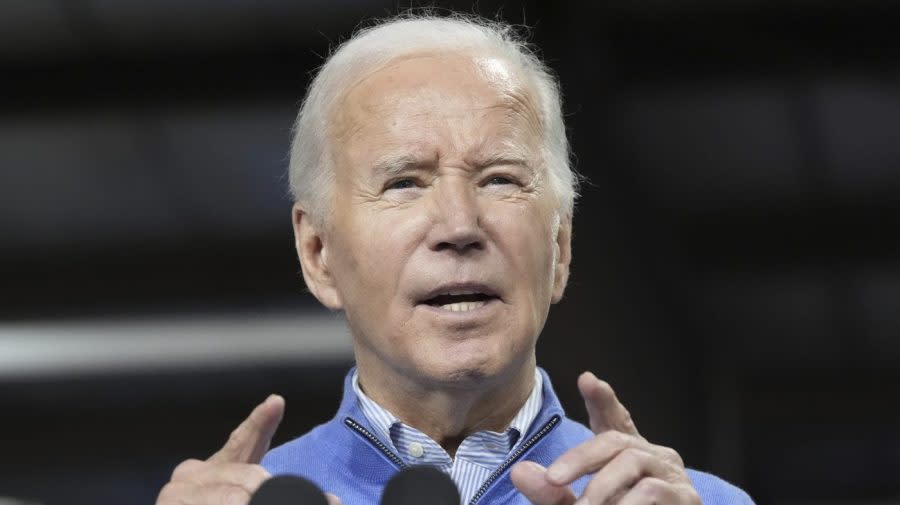What to know about the South Carolina primary

South Carolina is officially kicking off the Democrats’ presidential nominating cycle with its primary Saturday, weeks after President Biden won as a write-in candidate in New Hampshire’s unsanctioned contest last month.
It’s the first time the Palmetto State will be first in the party’s official lineup, and the state is expected to be a crucial metric of Biden’s reelection bid.
South Carolina hosts its Republican primary three weeks later, as former President Trump and former U.N. Ambassador Nikki Haley battle to win Haley’s home state.
Here’s what to know about South Carolina’s primaries this month:
Democrats shake up primary calendar
New Hampshire Democrats voted last month, but national Democrats aren’t counting that contest toward delegates for the party’s convention this summer.
The Democratic National Committee (DNC) is going with a Biden-backed plan to reshuffle the party’s nominating calendar in an effort to amplify diversity in the early states — booting Iowa and New Hampshire out of their first-in-the-nation slots to put South Carolina at the start of the lineup.
States that vote or caucus first are widely seen as key to candidates’ momentum for the rest of the nominating cycle, and the DNC aimed to elevate voices of color by putting more demographically diverse states earlier in the timeline.
Democrats in the Granite State, though, bucked the plan and held an unsanctioned Jan. 23 primary, which the DNC at one point knocked as “detrimental.”
Biden, whose name didn’t appear on the New Hampshire ballot, won the Democratic race with the help of a write-in campaign from his supporters in the state — but the DNC said delegates weren’t up for grabs.
Now, South Carolina will officially kick-start the Democrats’ process as the first state with Biden officially on the ballot.
Biden courts Black voters
South Carolina was pivotal for Biden when he clinched the Democratic nomination in 2020, which showcased his support among Black voters.
While South Carolina has been moved earlier in the Democrats’ calendar to elevate diverse voices, Biden has also seen warning signs for his support among Black voters, making the Palmetto State a critical first test in the cycle.
A November poll by The New York Times and Siena College found that 22 percent of Black voters in six battleground states — not including South Carolina — said they would support Trump in this year’s election.
Though Biden saw 71 percent support, the Trump figure is the highest percentage among Black voters a Republican presidential candidate has seen in a half century.
“When it comes to African American voters, I want to be very clear about this, that no administration has done as much for the African American community as President Biden and Vice President Harris,” Quentin Fulks, the principal deputy campaign manager for the Biden campaign, said last month when asked about the dip in support among the key demographic.
Biden challengers on the ballot
Biden, the incumbent and clear Democratic front-runner, will officially face his long-shot challengers for the first time on the Palmetto State’s ballot.
Minnesota Rep. Dean Phillips (D) scored about 20 percent in New Hampshire’s unofficial contest last week, behind the roughly 64 percent that went to Biden’s write-in effort.
Self-help author Marianne Williamson, who also ran for the White House back in 2020, earned 4 percent in the Granite State.
There are 65 delegates up for grabs in South Carolina, and a Democratic candidate needs 2,330 to secure the nomination.
Republicans vote Feb. 24
On the Republican side, GOP White House hopefuls have already had two official nominating contests, with Iowa’s first-in-the-nation caucuses and New Hampshire’s first-in-the-nation primary last month.
Trump won both, and several top contenders exited the race as voters began to weigh in.
Now, the race is down to a one-on-one between Trump and Haley, who came in third in Iowa and second in New Hampshire.
The next race on the calendar for Republicans is Nevada, which is set to see both a state-run presidential preference primary Feb. 6 and a state party-run caucus Feb. 8.
Trump will be participating in the caucus, while Haley will be taking part only in the primary — a process that’s sown confusion for voters in Nevada and prompted many in the party to turn their eyes to South Carolina, the fourth state on the GOP calendar.
The Palmetto State’s Republican primary will come Feb. 24 — roughly three weeks after the Democratic contest Feb. 3 .
Stakes are high for Haley, who was previously the governor of South Carolina, as she faces questions about her momentum to move forward — and as she looks to avoid embarrassment in her home state.
The latest polling averages from The Hill and Decision Desk HQ show Trump with a 30-point lead over Haley in South Carolina.
South Carolinians can vote in both contests
In South Carolina’s open primary system, registered voters can participate in either major party’s primary, regardless of affiliation.
“You can pick either primary but you can only vote in one,” according to the South Carolina Election Commission’s rules.
The state doesn’t require voters to register by party in order to take part in the process, and voting in either party’s presidential primary doesn’t confine the voter to that same party’s state primary later this year.
Voters had to meet January registration deadlines — Jan. 4 for Democrats and Jan. 25 for Republicans — in order to cast their ballots on Election Day.
Polls in South Carolina will be open 7 a.m. to 7 p.m. local time on Election Day, and anyone in line at closing will be allowed to vote.
For the latest news, weather, sports, and streaming video, head to The Hill.


